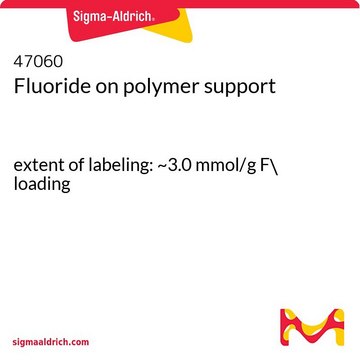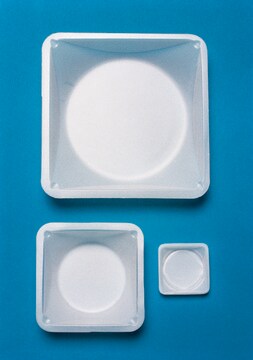685151
X-Phos, ChemDose™ tablets
Loading: 2μmol per tablet
Synonym(s):
2-Dicyclohexylphosphino-2′,4′,6′-triisopropylbiphenyl impregnated tablets, ChemDose™, X-Phos impregnated tablets
About This Item
Recommended Products
reaction suitability
reaction type: Buchwald-Hartwig Cross Coupling Reaction
reaction type: Heck Reaction
reaction type: Hiyama Coupling
reaction type: Negishi Coupling
reaction type: Sonogashira Coupling
reaction type: Stille Coupling
reaction type: Suzuki-Miyaura Coupling
reagent type: ligand
reaction type: Cross Couplings
matrix
Magnesium aluminometasilicate base material
functional group
phosphine
SMILES string
CC(C)c1cc(C(C)C)c(c(c1)C(C)C)-c2ccccc2P(C3CCCCC3)C4CCCCC4
InChI
1S/C33H49P/c1-23(2)26-21-30(24(3)4)33(31(22-26)25(5)6)29-19-13-14-20-32(29)34(27-15-9-7-10-16-27)28-17-11-8-12-18-28/h13-14,19-25,27-28H,7-12,15-18H2,1-6H3
InChI key
UGOMMVLRQDMAQQ-UHFFFAOYSA-N
Legal Information
Signal Word
Warning
Hazard Statements
Precautionary Statements
Hazard Classifications
Carc. 2
Storage Class Code
13 - Non Combustible Solids
WGK
WGK 3
Flash Point(F)
Not applicable
Flash Point(C)
Not applicable
Personal Protective Equipment
Choose from one of the most recent versions:
Certificates of Analysis (COA)
Don't see the Right Version?
If you require a particular version, you can look up a specific certificate by the Lot or Batch number.
Already Own This Product?
Find documentation for the products that you have recently purchased in the Document Library.
Which document(s) contains shelf-life or expiration date information for a given product?
If available for a given product, the recommended re-test date or the expiration date can be found on the Certificate of Analysis.
How do I get lot-specific information or a Certificate of Analysis?
The lot specific COA document can be found by entering the lot number above under the "Documents" section.
How should I dispose of spent ChemDose® tablets?
They should be treated as solid waste, contaminated with reaction species. The matrix is non-toxic and environmentally benign.
How should I store ChemDose® tablets?
As with most catalysts and ligands, as a general precaution it is best to store them in a refrigerator and/or under an inert atmosphere to maintain activity. Some catalysts, such as Pd(dppf)Cl2·CH2Cl2, are more robust and can be handled in air without issue. Please refer to the ChemDose® label for specific handling of a given catalyst, ligand, or reagent.
Can I use ChemDose® tablets in any solvent?
Yes, including aqueous solvents.
Do the ChemDose® tablets disintegrate during the course of the reaction?
They are normally recovered intact, however, they may disintegrate somewhat in aqueous reactions. Any disintegrated tablets can be removed from the reaction via filtration.
What is the pH stability of the ChemDose® tablets?
The ChemDose® tablets are mildly basic and will dissolve in the presence of mineral acids.
Can I use ChemDose® tablets in a microwave or pressure vessel?
Absolutely. Please see the Technical Information for Download section (below) for additional examples of cross-coupling reactions involving the use of microwaves.
How do I find price and availability?
There are several ways to find pricing and availability for our products. Once you log onto our website, you will find the price and availability displayed on the product detail page. You can contact any of our Customer Sales and Service offices to receive a quote. USA customers: 1-800-325-3010 or view local office numbers.
What is the Department of Transportation shipping information for this product?
Transportation information can be found in Section 14 of the product's (M)SDS.To access the shipping information for this material, use the link on the product detail page for the product.
My question is not addressed here, how can I contact Technical Service for assistance?
Ask a Scientist here.
Our team of scientists has experience in all areas of research including Life Science, Material Science, Chemical Synthesis, Chromatography, Analytical and many others.
Contact Technical Service









